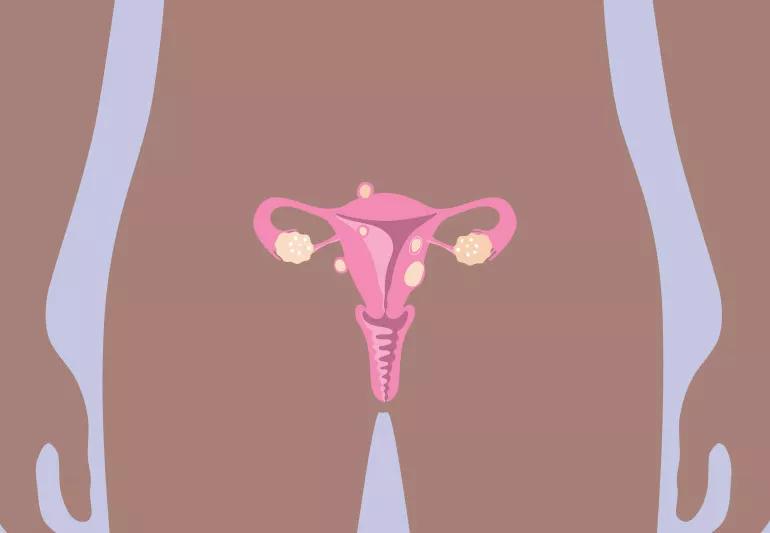Depending on their size, these noncancerous growths can create an abdominal bulge

Image content: This image is available to view online.
View image online (https://assets.clevelandclinic.org/transform/2f14fbdb-508c-4b65-9f9c-4a39306fd948/uterine-Fibroid-Tumors-1428226251-770x533-1_jpg)
Graphic of uternie fibroid tumers placed anotomically in a silhouette of a body
If you have uterine fibroids — a noncancerous growth in your uterus — you’re already familiar with challenging symptoms like heavy bleeding, pain, pressure and fatigue.
Advertisement
Cleveland Clinic is a non-profit academic medical center. Advertising on our site helps support our mission. We do not endorse non-Cleveland Clinic products or services. Policy
But can uterine fibroids cause weight gain?
Ob/Gyn Lindsey Valentine, MD, explains the connection between uterine fibroids and weight gain.
First, it’s important to understand uterine fibroids.
Uterine fibroids affect about 40% to 80% of women and people assigned female at birth (AFAB). Risk factors like a higher body weight, not having children and a family history of fibroids can increase your chances of getting uterine fibroids.
“Uterine fibroids are benign tumors or growths from the muscle wall of the uterus,” explains Dr. Valentine. “They can grow inside the uterus or they can grow on the outer surface of the uterus.”
Hormones like estrogen and progesterone, which are prevalent during childbearing years and start to decrease during menopause, can increase your risk of uterine fibroids.
You may have one uterine fibroid or you may have many that grow in a cluster.
“The size of a single fibroid can vary greatly. It can be really small — a couple of millimeters, which is the size of a pea or marble — or a larger fibroid could be the size of an orange or grapefruit,” Dr. Valentine further explains. “Or in rare situations, a uterine fibroid can be greater than 10 centimeters, which is the size of a melon.”
Advertisement
And as uterine fibroids grow, they can cause abdominal bulge or bloating.
“That can certainly give an appearance of weight gain or increased abdominal girth,” notes Dr. Valentine. “If someone has larger fibroids, it can create a visible abdominal bulge.”
Uterine fibroids don’t typically cause weight gain.
“Smaller fibroids typically don’t weigh much, maybe a few grams,” Dr. Valentine clarifies. “But in rare cases, large fibroids could weigh maybe four or five pounds.”
An important distinction: The mass and size of a uterine fibroid can cause weight gain, meaning it’s unlikely that a uterine fibroid is causing other metabolic or systemic changes that lead to true weight gain.
Smaller uterine fibroids may not cause any symptoms, but you may experience the following if you have larger uterine fibroids:
Yes.
“Especially with larger fibroids or a larger cluster of fibroids, they can increase or stretch the size of the uterus,” states Dr. Valentine. “You can experience a lower stomach bulge or pressure along with an increased abdominal girth. It can be accompanied by a feeling of fullness or bloating. And if the uterine fibroids start to get larger, you can even look like you’re pregnant.”
Probably not.
“Once you remove a uterine fibroid, the weight of the fibroid itself and that pressure should be gone, and then any of the subsequent pressure on your bowel, bloating and fullness also should decrease after removal,” says Dr. Valentine.
There are many treatment options for uterine fibroids, including removing them during a surgical procedure, but it all depends on the size, location and number of fibroids. Your healthcare provider will also take into consideration your wishes for future pregnancies, as certain operations can damage the uterus.
But many small fibroids don’t cause any problems. And if you experience symptoms, your provider may suggest trying over-the-counter pain medication to help with pain as well as hormonal medications like birth control, which can help control heavy bleeding. There are other medications that can help shrink your fibroids, too.
“Even with large uterine fibroids, significant weight loss is not typical after surgery,” reiterates Dr. Valentine. “But patients may notice that clothes fit better and visible abdominal bulging, if related to fibroids, should improve.”
Advertisement

Sign up for our Health Essentials emails for expert guidance on nutrition, fitness, sleep, skin care and more.
Learn more about our editorial process.
Advertisement
Sometimes, gaining weight is a health necessity
Study examines if alcohol habits + obesity are related
Plus 4 ways to break the cycle + maintain your weight loss
The answers may surprise you
The common hormonal condition is linked to insulin resistance, which can cause weight gain
Losing menopause weight may take more effort, but it’s doable
Depending on size and location, they can affect your rectum, stomach, bladder and kidneys
Diet sodas are associated with weight gain, and may even cause insulin confusion
Type 2 diabetes isn’t inevitable with these dietary changes
Applying a hot or cold compress can help with pain
Pump up your iron intake with foods like tuna, tofu and turkey